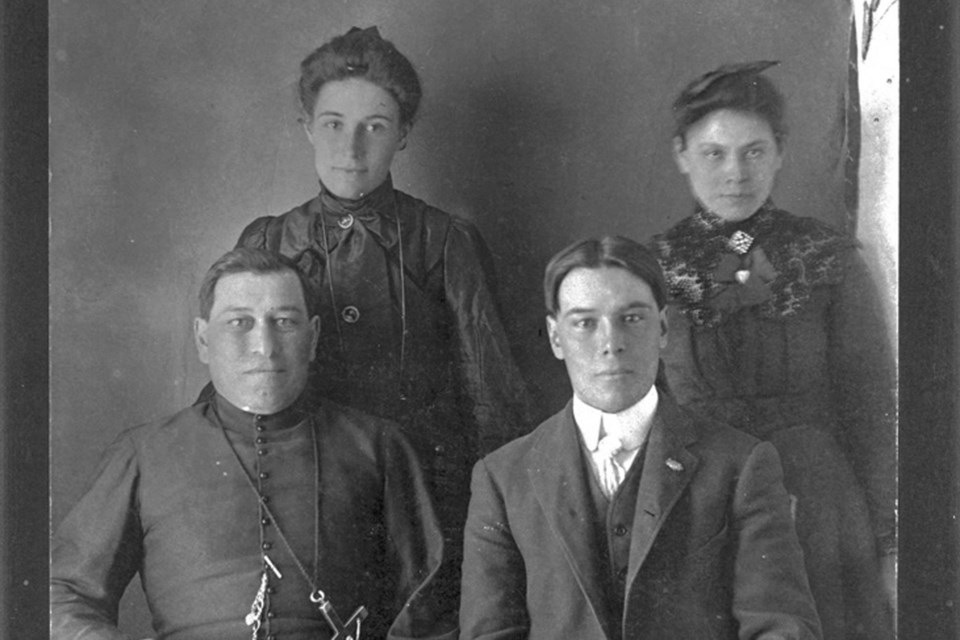Though Indigenous people have lived along the Sturgeon River for thousands of years, it was Métis homesteaders that helped create and grow St. Albert.
One of the community's founding families, the Cunninghams, still call the original family site out on Meadowview Drive home.
If you've seen the street named after the family near Paul Kane High School, that's the Cunninghams.
If you've toured one of the restored houses on River Lot 24 at Grain Elevator Park, that's part of the Cunningham story too.
And if you've noticed the script on the side of every school bus that journeys the streets of the city through most of the year – Cunningham Transport – yes, that's the same family that helped establish the city more than 150 years ago.
Laura Doroshenko, who manages the fleet of 186 school buses and 190 employees of Cunningham Transport (still based at the original homestead site out Meadowview Drive, near Sandpiper Golf and Country Club), said she's proud to be part of the storied family, one that has made so many contributions to St. Albert.
Doroshenko remembers her early childhood living in the very home that is now part of the historic site on River Lot 24, when raising chickens, pigs, cattle, oats and grain were the family enterprise, and getting to school involved a horse and sled.
"There was no Ray Gibbon Drive back then – it was a straight line from the farm to the grain elevators. My dad (Edward) and uncle (Chester) helped grandpa (Patrick) on the farm, and they went to school, curled and played ball in St. Albert too. Mom and dad started the bus company, and he was the first driver and makeshift mechanic," said Doroshenko.
"I'm proud of 49 years of a locally-owned and operated bus company (which also has routes throughout Edmonton and beyond, and includes a full service shop and driver training school). We had many strong role models to follow through all the generations of the family."
During the Riel Resistance of 1885, Samuel Cunningham was captain of the St. Albert Mounted Rifles (brother Alfred was a sergeant), a group formed to protect St. Albert and area. James Cunningham was a freighter in the late 1800s, as was his brother Henry, who also served on St. Albert's first town council in 1904.
"The Cunninghams have made important contributions to St. Albert since our beginning – and several of John Cunningham's family members have played a significant role in the development of our city," said Vino Vipulanantharajah, archivist at the Musée Héritage Museum.
Doroshenko's dad Edward, now 84, and her mom Jean Comeau, 79, ran the family farm and then founded Cunningham Transport in the 1970s, a company they still own today.
"My great grandfather was John Cunningham (who came from west of Manitoba with fur buyers, and died in a buffalo hunt in 1868). A few of the Cunningham brothers got river lots as original homesteaders – scrip, it was called – marrying Indigenous women and helping create this important Métis settlement," said Doroshenko.
She said she is now seeking to officially name the bridge near the family homestead as Cunningham Bridge through a formal request with Sturgeon County.
"There was a rope over a swimming hole under the bridge, and all the early families of the area always called it Cunningham Bridge. I'd like to see the name become official, before more development happens and it gets named something else. It's important that the Métis history of our area stays in the spotlight."
The Cunningham clan, past and present, keep Indigenous matters at the heart of their legacy.
Doroshenko's uncle Chester created the Native Counselling Services of Alberta, an agency focused on social justice for Indigenous people.
The organization has healing programs for children, at-risk youth and Indigenous offenders. It also offers help to guide clients through the court system. In his time, Chester Cunningham received the Order of Canada award for his contributions to the Indigenous community.
Doroshenko's son Zack works with an Indigenous organization, and her daughter Sarah Midanik is president and CEO of the Gord Downie & Chanie Wenjack Fund, which aims to improve the lives of Canada's first people by telling Wenjack's residential school story.
Through 1,600 legacy schools and spaces across the country, Midanik said the fund's goal is to educate Canadians about the true history and legacy of residential schools.
"We were raised to be service-oriented. My mom took over the company granny started, so we have that example of strong, inspiring matriarchs in the family," said Midanik, who previously ran the Native Women's Resource Centre in Toronto.
Doroshenko herself is a regular donor to the St. Albert Housing Society, which helps seniors, families, and individuals find safe and secure affordable housing.
Today, Doroshenko's son Zack lives in the home her parents built in the 1960s, the home her brother lived in before that and her parents before him – a passing of land and tradition from one generation to the next.
"I do feel optimistic that there's a greater awareness of Indigenous history and culture, especially in the schools," Doroshenko said. "And I'm proud to be part of the history here – that we have generation after generation of the same Metis family living on the same land that was settled all that time ago."




